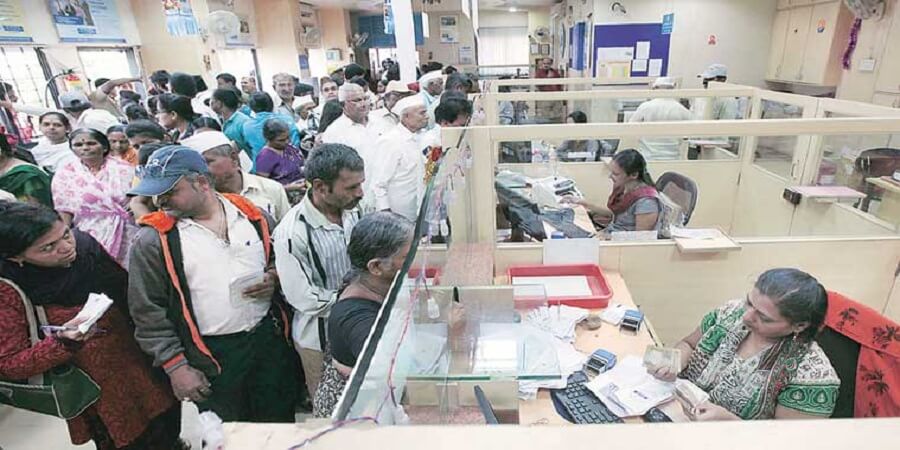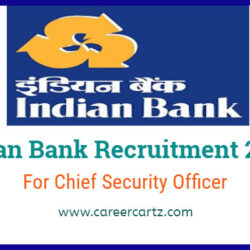
Bank jobs have a huge craze among the youth in India, and especially the jobs with the Government (or Public Sector) Banks like SBI, Allahabad Bank, Punjab National Bank, etc. The Bank Probationary officer’s job in a Public sector unit is considered one of the most attractive jobs in terms of job stability, remuneration, and other benefits. Even the banking jobs in the private sector are great in terms of salaries and career growth. After all, the Banking sector is one of the fastest growing sectors in India. Bank deposits have grown at a rather rapid compounded annual growth rate of 12%, to $1.54 trillion, from 2006 to 2017. The credit growth, in 2017-18, is also expected to be at 7-8%. In this article, we will talk about how to get bank jobs in India with focus on eligibility and exams.
How to Get Bank Jobs in India
Eligibility and Exams for Govt. and Private Banking Jobs in India
Co-authored by Parinita Gupta

Banking is one of the most chosen career sectors in India. The demand for banking is taking up this career even higher as banks had become the backbone of the Indian economy. There is a rapid growth in the banking sector and this has paved many banking career opportunities. There are 27 public sectors and 25 Private sector banks in India. Huge demand had created and there are many vacancies in both the public and private sector of banks in India. After having a huge demand, still, students struggle to settle in a banking sector, as most of the aspirants don’t know where to start and how to start and what are the main eligibility criteria to apply?
Basic Eligibility Criteria for Bank Jobs in India
The first and foremost factor that is considered during the recruitment process is graduation. The aspirant must have to complete his or her graduation in any discipline with good percentile. For reserved category aspirants (SC/ ST/ PWD or any other such category) a minimum of 55% of marks is required.
There are mainly two positions for a graduate
- Clerical – Clerical posts job include the positions like a clerk, clerk-cum-cashier, typist, steno, agricultural clerks, data entry operators, and telephone operators
- PO – Probationary officer post- As the name indicates the selected candidates will be under probation i.e the performance of the student will be analyzed during the candidates training period and then will be hired.
Eligibility Criteria to become a clerk
- The candidate must be a citizen of India.
- If the candidate wants to apply for the clerical post, he/she must be a graduate and +2 with 60% or more marks.
- In some banks, the minimum required qualification can be 10 + 2, and the maximum age limit for the candidate for applying the 25 or less than 25. But in such cases, a diploma degree candidates with excellent practical knowledge will be hired.
- The candidate must be between the age group of 18-28 year and relaxation age limit for SC/ST/OBC/PH or any other reserved category.
- In Public Sector banks, Rs 140,000/- is the average salary for entry-level clerks per annum.
Eligibility Criteria to become a PO
- The candidate must be a citizen of India.
- For the post of the probation officer, the candidate’s age should be at least 21 years and maximum of 30 years.
- The candidate must have a bachelor’s degree from a recognized university with 55 % – 60 % marks aggregate.
- The candidate must have good knowledge of computers and especially MS Office.
- In Public Sector banks, Rs. 200,000/- is the average salary received by a PO per annum. Bank POs can make close to INR 50,000/- inclusive of various allowances.
Generally, In a public sector bank, graduates, and postgraduates are selected through an entrance exam, while most of the private and Foreign hire the professional candidates like engineers, lawyers, MBA’s and CFA’s etc.
Related Articles:
Banking and FinTech Ecosystem in India – Trends, Top Startups, Jobs, Challenges and Opportunities
Analyst Jobs in the Finance & Banking Sector in India for Fresh Graduates
Mobile Wallet War in India: Paytm vs PhonePe vs Google Pay vs Amazon Pay
How to Get a Govt Bank Job in India
To get a govt bank job, Aspirants have to crack the exams conducted by the various institutions in India. There are four Institutes which give you an opportunity to get a govt bank job:
- The Institute of Banking Personnel Selection (IBPS)
- The State Bank OF India (SBI)
- Reserve Bank of India (RBI)
- National Bank For Agriculture And Rural Development (NABARD)
- Institute of Banking Personnel Selection (IBPS)
The Institute of Banking Personnel Selection commonly known as IBPS – Millions of candidates appear for this exam for various job roles. Maximum number of banks like Allahabad Bank, Indian Bank, Central Bank of India, United Bank of India, Syndicate Bank, Indian Overseas Bank, Andhra Bank, Dena Bank, Oriental Bank of Commerce, Vijaya Bank, Bank of Maharashtra, Canara Bank, Union Bank of India, Punjab exam National Bank, UCO Bank, Corporation Bank, Bank of India, Punjab and Sind Bank, ECGC, Bank of Baroda and IDBI BANK, etc hire the candidates by considering the ranks and scores obtained by the student in this exam.
IBPS is a common exam which is used to hire the job roles like PO, Clerical Cadre, Group A (Scale – I, II and III) and Group B Assistants for Regional Rural Banks (RRBs), Specialist Officers in government banks.
- State Bank OF India (SBI)
The State Bank of India conducts an examination to fill posts in SBI bank and its Associate Banks like The State Bank of Hyderabad, State Bank of Travancore, State Bank of Patiala, State Bank of Bikaner and Jaipur, State Bank of Mysore, and many more.
There are two kinds of SBI exams for Clerk and a PO post.
- Reserve Bank of India (RBI)
Reserve bank of India conducts an exam to select the candidates for RBI GRADE B OFFICERs. It is one of the most prestigious job roles in India where millions of aspirants attend the exam to join in RBI
- National Bank For Agriculture And Rural Development (NABARD)
NABARD recruits Grade A and Grade B Officer i.e Assistant Manager and Manager roles to fill the vacancies all across India. NASCAR basically deals with rural banks with a moto of developing the rural areas.
IBPS PO 2018 Exam Pattern
IBPS has released new exam pattern for IBPS PO 2018-19 Exam. Now IBPS introduced separate sectional timing for each section in preliminary exam. IBPS PO 2018 Exam will be conducted in three phases: Preliminary Exam, Mains Exam, and Interview Process. It is mandatory for a candidate to clear each level of examination to get selected to the post of Probationary Officer in multiple Public Sector Banks.
IBPS PO Preliminary Exam Pattern 2018 – 2019
The IBPS PO preliminary examination is conducted online and candidates are allocated total duration of 1 hour to complete the preliminary exam. It consists of 3 sections with a total of 100 questions and a maximum score of 100 marks. There is negative marking in IBPS PO preliminary exam and 0.25 marks are deducted for each wrong answer attempted by a candidate. It is necessary to clear the cut-off in all 3 sections to qualify for the IBPS PO Main exam.

IBPS PO Mains Exam Pattern 2018 – 2019
IBPS PO Mains Exam has encountered quite a number of changes. Let’s have a look at all these changes in detail.
• Introduction of Descriptive Paper: Just like SBI PO 2018 Exam, IBPS introduced Descriptive Paper in its Mains Examination where candidates will be judged on their written skills. An essay and a letter will be given to candidates to write that will constitute 25 marks and that has to be completed in a time span of 30 minutes.
• The overall time allotted for each section has also been changed.
• No separate paper will be conducted for Computer Applications. The Reasoning section is teamed up with Computer Aptitude section and this entire section will contain 45 questions of a total of 60 marks.
• The overall time allotted for IBPS PO 2018 Mains Exam has also been changed from 140 minutes to 180 minutes.

IBPS PO Syllabus 2018 – 2019
To ace IBPS PO exam, it is really necessary to know the detailed IBPS PO Syllabus. The syllabus is a bit different for IBPS PO 2018 Preliminary Exam and IBPS PO 2018 Mains Exam. Let’s have a look at the syllabus of both these phases of IBPS PO 2018 Exam:
IBPS PO Preliminary Exam Syllabus
IBPS PO Preliminary Exam is the primary selection round of IBPS PO 2018 Exam. Candidates who clear the preliminary exam are eligible to appear for the mains exam. The Preliminary Exam of IBPS PO 2018 comprises of three major sections: Reasoning, Quantitative Aptitude, and English Language.
IBPS PO Mains Exam Syllabus
The mains exam is the important phase of IBPS PO 2018 Exam. Maximum weightage is given to score obtained by a candidate in IBPS PO Mains Exam in the final selection to the post of Probationary Officer. The Mains Examination of IBPS PO exam 2018 consists of 4 + 1 sections: Reasoning & Computer Aptitude, English Language, Quantitative, Aptitude & General Awareness. Just like SBI PO 2018, IBPS has introduced a descriptive paper in its mains exam for selection of candidates to the post of the PO.
Related Articles:
Must Read Tactics to Remain Motivated During UPSC – IAS Preparation
IBPS PO Exam Syllabus and New Pattern
How to Get Bank PO Jobs in India
Problems and Challenges Faced by Bank POs
UPSC Syllabus and Exam Pattern
UGC-NET Eligibility, Syllabus and Exam Pattern
How to Get Jobs in the Private Banks of India
In India, candidates prefer joining government banks or public sector banks due to job security reason. But there are many private banks which are highly secured and pay a very good amount as salary. People think that private sector banks hire directly from the top B-school colleges, It is not completely true.
Apart from the direct hiring 30% of private banks hire candidates through IBPS and CWE (common written examination). Once a candidate clears the IBPS they can directly apply from the official portal to get into a private sector bank since IBPS does not include few private sector banks.
Some of the popular private banks in India are HDFC Bank (hdfcbank.com/aboutus/careers/default.htm), ICICI Bank (icicicareers.com), Axis Bank, Indian Bank (indianbank.in), Federal Bank, IndusInd Bank, Catholic Syrian bank, Yes bank etc., release their vacancy list on their official websites. The only way to join these private sector banks or foreign banks is by clearing the IBPS or CWE exam and applying directly from the official portal of each bank respectively.
There are few international banks like Standard Chartered, American Express, Bank of America, Royal Bank of Scotland, Citibank, etc, which are not located in India or limited in metropolitan cities. Even these companies hire candidates who are experienced and specialized in this field. If you are very much interested to work in an international bank, better get in touch with a career coach, mentor or recruitment consultant who could help you in the process. Sources
- HDFC Future Bankers Recruitment 2024 Latest Private Job Opportunities - 15/04/2024
- The Benefits of Working in Government Legal Jobs - 24/02/2024
- Top Highest Paying Bank Jobs in Hyderabad - 22/02/2024



